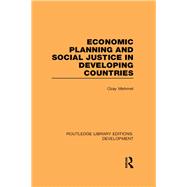- ISBN: 9780415596114 | 0415596114
- Cover: Hardcover
- Copyright: 1/14/2011
First published in 1978, this book was written at a time when belief was high in Western-guided economic development of the emerging countries. The success of Marshall Plan in war-torn Europe generated a US-led optimism that, with generous inflows of aid and technical assistance, the Third World could be won over in the Cold War. The author's direct experience as a young academic economist in Cyprus, Malaysia, Uganda and Liberia led him to question this general optimism: the reality on the ground in the developing world did not seem to match Western optimism. Theories and blueprints, made in the West, did not fit the requirements of developing countries.Higher production and better income distribution were inseparable twin objectives of developing nations. That meant, production of a higher national output must at the same time promote social justice. Investment must create adequate jobs so that new entrants into rapidly expanding labor force could be gainfully employed. Yet, the dominant (Western) theories of development at the time, in particular the Trickle Down Theory of Growth, prescribed "Growth First, Distribution Later" strategy. Similarly, Import Substitution Industrialization theories were emphasized at the expense of export-led growth. Dualistic Growth theories preached urban-biased, anti-rural development.This book was written as a rebuttal of such faulty theorizing and misguided professional technical assistance and the book's message is no less valid today than in the 1970's.







